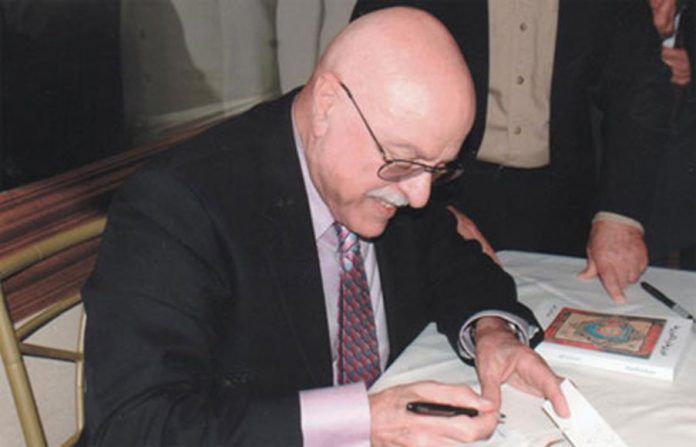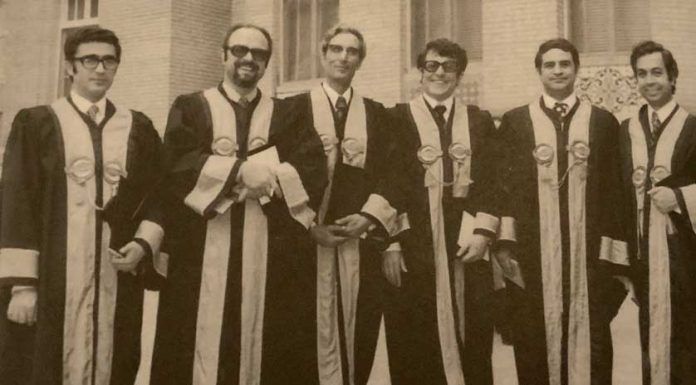By Siavash Azeri
The respected Iranian journalist and author Dr. Sadreddin Elahi died on Dec. 29 in a hospital in northern California, aged 87.
Dr. Elahi was among a select group of reporters and writers who were the pioneers of modern-day journalism in Iran. Dr. Elahi was the president of and a professor of journalism at the Faculty of Communication Sciences and Media Studies in Tehran. He was also the co-founder of Kayhan Publishing’s weekly magazine, Kayhan Varzeshi (Kayhan Sports).
Like many Iranians, Dr. Elahi and his wife Etrat Goudarzi and their two children (Borzoo and Baran) left Iran after the 1979 Islamic Revolution and settled in northern California.
Yet exile did not curb Dr. Elahi’s innate enthusiasm for writing. He produced essential works, including articles titled “undated notes” for Kayhan London.
Dr. Elahi also authored several books, including “Seyyed Zia,” “The First or Second Man of the Coup d’état,” “Distances and Longings,” “With Saadi in Life’s Market Place,” and “A 100-Year-Old Child Named Modern Poetry” which included a conversation with the celebrated contemporary Iranian poet Nader Naderpour (1929-2000). Dr. Elahi’s articles, essays, and books gained a global readership.
Many of Dr. Elahi’s long-time colleagues and close friends, including the late Dr. Mostafa Mesbahzadeh (1908-2006), the founder of Kayhan Publishing and managing editor of the Kayhan daily newspaper, lovingly nicknamed him “Sadrol” (short for Sadreddin).
[aesop_image img=”https://kayhanlife.com/wp-content/uploads/2022/01/elahi-mesbahzadeh-azari-768×410-1.jpg” panorama=”off” align=”center” lightbox=”off” captionsrc=”custom” caption=”From Left: Sadreddin Elahi, Mostafa Mesbahzadeh and Siavash Azari. KL./ ” captionposition=”left” revealfx=”off” overlay_revealfx=”off”]
Anytime he came across an interesting piece written by one of his many former students, Dr. Elahi would call the person and encourage them to continue their excellent work.
After receiving a doctorate in Sports Sociology in France, Dr. Sadreddin Elahi moved to San Jose and Berkeley, California in 1978 to pursue his studies. He remained in California after the 1979 Islamic Revolution.
His biggest wish was to return to Iran one day and gain deeper insight into the pain of those who had lived through four decades of turmoil in the country. He was a vocal critic of those whose onslaught on Iranian culture and tradition included tearing Ferdowsi’s epic poem, Shahnameh (Book of Kings), at Mashhad University.
While living in France, Dr. Elahi covered the Algerian War of Independence (1954-1962) for the Kayhan daily. He also wrote an excellent article titled “Grocers and Petty Bourgeoisie Overthrew de Gaulle” on the growing popularity of French President Charles de Gaulle, which ultimately led to his resignation in April 1969.
Dr. Elahi published several of his poems, but he preferred writing articles and essays more than anything else. He was not a massive fan of computers and used an old-fashioned pen and paper to write and a fax machine to send his pieces to publishers.
Although he was a co-founder of Kayhan Varzesh, Dr. Elahi never accepted the job of editor-in-chief of the weekly. He also wrote articles for other weeklies, including Tehran Mosavar (Tehran Photography, or Illustrated).
News of Dr. Elahi’s sudden death has shocked and saddened his fellow journalists and Iranians worldwide.
Kayhan London and Kayhan Life offer their sincere condolences to Dr. Elahi’s wife Etrat Goudarzi, their two children Borzoo and Baran, his sister Giti Semsar, Mesbahzadeh family, Ahmad Mesbah, faculty and graduates of Faculty of Communication Sciences and Media Studies, his readership, his Kayhan colleagues and the entire community of Iranian journalists and writers.
[aesop_image img=”https://kayhanlife.com/wp-content/uploads/2022/01/elahi-gorgin-768×616-1.jpg” panorama=”off” credit=”Dr. Elahi with wife Etrat Goudarzi. KL./” align=”center” lightbox=”on” captionsrc=”custom” captionposition=”left” revealfx=”off” overlay_revealfx=”off”]



